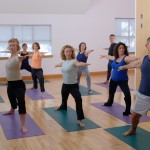

 Regardless of religious denomination, many people attend some sort of service on a weekly or monthly basis. Religion is an important aspect in many lives and is a way to feel connected, not only to a higher power but also to each other.
Regardless of religious denomination, many people attend some sort of service on a weekly or monthly basis. Religion is an important aspect in many lives and is a way to feel connected, not only to a higher power but also to each other.
Church services bring together people to pray and feel united, but a new trend which is being sparked across American may offer benefits to your heart as well. Churches are now getting involved in the health-craze and offering support to help their congregations get healthier.
Capital Baptist Church in Virginia is an example of a church which has offered to help those in the community become healthier. Their program is fittingly titled Bod4God. However, they don’t stand alone in their quest to make people healthier; experts say many churches across America are now offering support for those looking to improve their health.

Many churches, in fact, have their own fitness centers which include basketball courts, weight and fitness rooms. Some congregations have even teamed up with the American Heart Association (AHA) to help monitor blood pressure and cholesterol.
But why would a church be the place to begin your fitness journey? Well, a large key to successful health changes involves support, and a church offers many forms of support. Not only from those who attend the church but through preachers, priests and experts who can work with a person not only on a fitness level, but an emotional and spiritual one as well. Often times this kind of support is lacking and deters individuals from completing their fitness journey.
Not only can a religious establishment promote good health and well-being, but religion in itself can have benefits to health. Religion influences health in four major ways: health behaviors, social support, psychological states and ‘psi’ interpretation (supernatural laws that govern ‘energies’ not understood by science).
Religion can be used to empower individuals by connecting them to each other to build a community. Not only does this offer support, but it can lead to psychological stability which can improve and maintain a healthy mental well-being.
Additionally, religion offers individuals a safe venue to pursue their goals. If a person is intimidated by mainstream gym facilities, churches with their own fitness centers may appear safer and less judgmental.
By now we know the benefits of meditation and yoga. In one documented study it was shown that meditation and yoga can help reduce blood pressure which is a contributing factor to cardiovascular disease. Another comparative study from Sweden revealed that those who practiced yoga had lower blood pressure than the control group which did not do any yoga. Such research shows the power of spirituality together with exercise as an effective means to improve health.
It doesn’t matter what religion you follow, believing in something, along with being part of a supporting social group, is enough to improve health, boost motivation and help you embark on healthier lifestyle choices.
If you’re ready to start practicing a healthier life, look into your local churches for any programs which can help you achieve your health goals. If you want to start your own, the AHA has a program called EmPOWERED To Serve which can help you set up fitness and health programs in your local community.
Whatever prompts you to make healthier choices – religion, family, etc. – it’s never too late to begin. The first step is just getting started.
Does prayer belong in hospitals?
We pray for many reasons. We pray to feel closer to that universal higher power, we pray for others and we pray for our health. There have been reports that those who have prayed for good health have recovered from serious illness. Continue reading…
The wonders of tai chi for the elderly
According to a recent report published in the journal Evidence-Based Complementary and Alternative Medicine, the results of an extensive review of research reports showed that tai chi is an effective exercise for both body and mind. Tai chi teaches the mind to move energy across the body using distinct slow movements. Continue reading…
Copyright © www.orthopaedics.win Bone Health All Rights Reserved